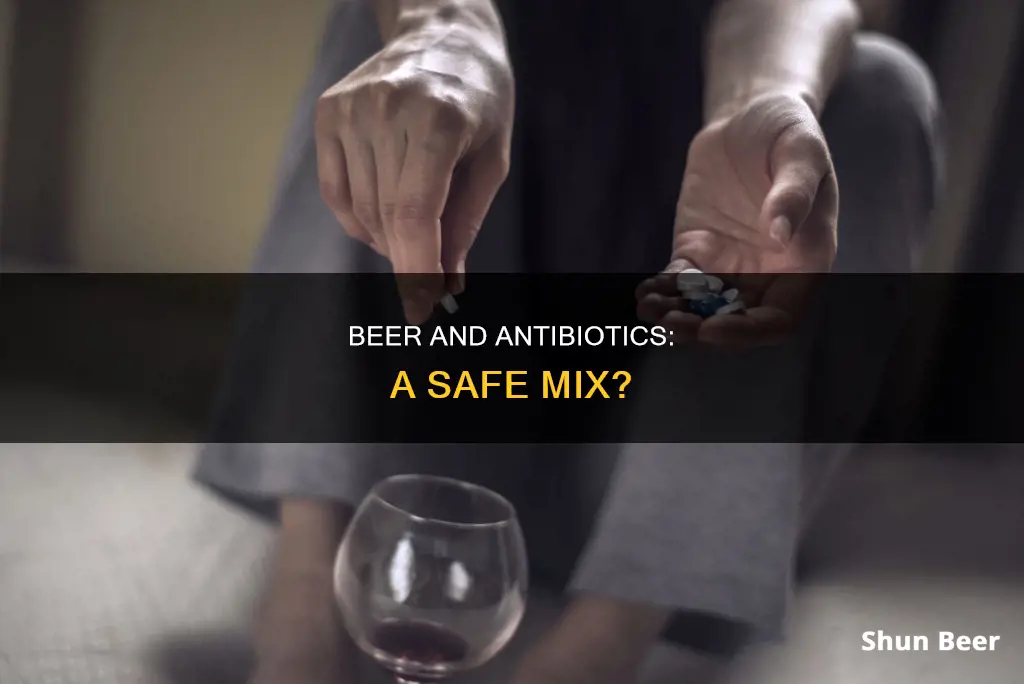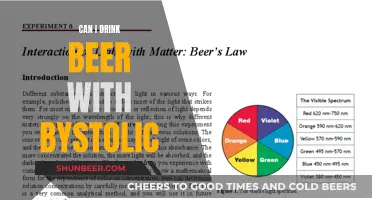
Antibiotics are powerful medications used to treat bacterial infections, and it is important to exercise caution when combining them with other substances. Alcohol is known to increase the likelihood of side effects from antibiotics, including digestive issues, drowsiness, dizziness, nausea, and vomiting. While moderate alcohol consumption is usually fine, certain antibiotics require refraining from alcohol to avoid negative interactions. These include metronidazole, tinidazole, and sulfamethoxazole, among others. Alcohol can also hinder recovery by causing dehydration and impairing immune system function. Therefore, it is generally recommended to avoid alcohol until completing a course of antibiotics and allowing the body to recover fully.
| Characteristics | Values |
|---|---|
| Should I drink beer with antibiotics? | No, it is not recommended to drink beer or any other alcoholic beverage with antibiotics. |
| Why? | Alcohol can hinder the effectiveness of antibiotics and cause a range of negative side effects. |
| What are antibiotics? | Antibiotics are powerful medications that destroy or slow down the growth of bacteria. |
| What are the side effects of drinking alcohol with antibiotics? | Nausea, upset stomach, interrupted sleep, lowered immune response, liver problems, disulfiram-like reaction, flushing, stomach cramps, vomiting, difficulty breathing, altered mental status, increased blood pressure, fever, drowsiness, dizziness, anxiety, chest pain, heart palpitations, diarrhoea, stomach pain, liver damage, lowered antibiotic effectiveness, increased antibiotic toxicity, etc. |
| What should I do if I'm unsure? | Consult your doctor or pharmacist to understand the specific interactions and side effects of the antibiotics you are taking. |
What You'll Learn
- Alcohol and antibiotics can cause similar side effects, which are amplified when both are consumed
- Alcohol can hinder the body's ability to heal and fight infection
- Alcohol may cause a dangerous reaction with certain antibiotics
- Alcohol can interfere with the absorption of some antibiotics
- Alcohol can be found in some medicines and mouthwashes

Alcohol and antibiotics can cause similar side effects, which are amplified when both are consumed
Alcohol and antibiotics can have similar side effects, and consuming both at the same time can amplify these effects. While alcohol does not usually affect how well an antibiotic fights an infection, the combination may lead to unpleasant side effects.
Drinking alcohol while taking antibiotics can increase your chance of experiencing certain side effects, such as digestive problems, including stomach pain, diarrhea, and ulcers, as well as flushing, which is the reddening and warming of your skin. These side effects are similar to those that can be caused by antibiotics alone, and consuming both together can make these effects worse.
In addition, alcohol can affect how antibiotics are metabolized in the body. It is broken down in the liver by enzymes, and some antibiotics are metabolized by the same or similar enzymes. Acute alcohol consumption can interfere with the breakdown of the drug, leading to increased levels of the antibiotic in the body, which can result in greater drug toxicity and side effects. On the other hand, chronic alcohol use can induce enzyme levels, causing the drug to be broken down more quickly, which may lead to decreased levels of the antibiotic in the body, potentially impacting the effectiveness of the treatment.
Furthermore, drinking alcohol while fighting an infection can cause dehydration, upset stomach, disrupt normal sleep patterns, lower your immune response, and hinder your body's ability to heal itself. These effects can prolong the recovery process and interfere with your treatment.
It is important to note that some antibiotics, such as metronidazole, tinidazole, cefoperazone, cefotetan, and ketoconazole, should never be consumed with alcohol as it can lead to a potentially dangerous reaction. Always check with your doctor or pharmacist before mixing alcohol with any medication to ensure your safety and avoid any harmful interactions.
Beer and Lifting Weights: A Healthy Balance?
You may want to see also

Alcohol can hinder the body's ability to heal and fight infection
Drinking alcohol while taking antibiotics is rarely a good idea. Both alcohol and antibiotics can cause side effects in your body, and consuming alcohol while taking antibiotics can increase your risk of harmful effects.
Furthermore, alcohol is known to weaken the immune system, making your body more susceptible to diseases such as pneumonia and tuberculosis. It can also slow down your body's ability to ward off infections, even up to 24 hours after drinking. This means that drinking alcohol while fighting an infection can prolong your illness and delay your recovery.
Consuming alcohol while taking antibiotics can also lead to unpleasant side effects, including digestive problems such as stomach pain, diarrhea, and ulcers. It can also cause liver damage, especially when combined with certain antibiotics that also affect the liver. These negative side effects can further hinder your body's ability to heal and fight infection.
It is important to note that the effects of mixing alcohol and antibiotics depend on the specific antibiotic and your overall health status. Some antibiotics should never be mixed with alcohol, while others may be safe in moderation. Always check with your doctor or pharmacist before consuming alcohol with antibiotics to ensure your safety and avoid any potentially dangerous interactions.
Drinking Beer on a Boat in Pennsylvania: What's Legal?
You may want to see also

Alcohol may cause a dangerous reaction with certain antibiotics
Mixing alcohol and antibiotics may also cause side effects like liver problems or a "disulfiram-like reaction". Some antibiotics cannot be taken with alcohol at all, so it is important to follow your healthcare provider's instructions. It is also important to tell your doctor about all the medications you use, including over-the-counter drugs, vitamins, and herbs.
You should never consume alcohol while taking the following antibiotics: Metronidazole, tinidazole, cefoperazone, cefotetan, and ketoconazole. Drinking alcohol while taking these drugs can cause a potentially dangerous reaction.
Drinking alcohol while taking isoniazid and linezolid can cause side effects such as nausea, vomiting, stomach pain, flushing, and liver damage. Alcohol can also affect how some antibiotics are metabolized in the body, which could lower the effectiveness of the antibiotic or increase its toxicity.
In most cases, it is best to wait until you are done with your antibiotic course before consuming alcohol.
Gluten Allergy and Beer: Is It Safe to Drink?
You may want to see also

Alcohol can interfere with the absorption of some antibiotics
Alcohol can have an impact on the absorption of some antibiotics. This is because alcohol is metabolised (broken down) in the liver by enzymes, and some drugs are metabolised by the same or similar enzymes.
When a large amount of alcohol is consumed, certain enzymes in the body are affected, and they are not able to break down drugs as effectively for metabolism. This can lead to higher levels of the antibiotic in the body, which could increase drug toxicity and side effects.
On the other hand, when alcohol is consumed daily, enzyme levels can be "induced", meaning the drug is broken down more quickly in the body, and levels of the antibiotic in the blood may decrease. This could result in the infection not being cured and lead to antibiotic resistance.
Some specific examples of antibiotics that may be affected by alcohol consumption include:
- Erythromycin: Alcohol may delay the absorption of this antibiotic into the bloodstream and lower its effectiveness.
- Doxycycline: Alcohol may decrease the levels of this antibiotic in the body, particularly in those who consume alcohol chronically.
- Rifampin: Alcohol consumption should be avoided with this antibiotic due to the risk of increased liver toxicity.
It is important to note that the effects of alcohol on antibiotic absorption can vary depending on the specific antibiotic and the amount and frequency of alcohol consumption. It is always recommended to consult with a doctor or pharmacist before consuming alcohol while taking any medication.
The Magic of Beer Dispensers: How Do They Work?
You may want to see also

Alcohol can be found in some medicines and mouthwashes
Some medicines, such as cold and flu products, may contain alcohol. It is important to always check the labels of any medications you are taking to ensure they do not contain alcohol. This is especially important if you are also consuming alcoholic beverages, as mixing alcohol with certain medications can increase your risk of experiencing side effects.
Mouthwashes are another source of alcohol that people may not always consider. Mouthwashes can have a high alcohol content, with some containing between 14% and 26.9% alcohol. This is much higher than the alcohol content of beer or wine, which typically ranges from 3% to 12%.
The high alcohol content in mouthwashes has led to concerns about their potential link to oral cancer. Some studies have suggested that regular use of alcohol-containing mouthwashes can increase the risk of developing oral cancer. However, the evidence on this topic is conflicting, and more research is needed to confirm the association.
In addition to the potential health risks associated with the alcohol content, mouthwashes may also contain other ingredients that can be harmful if ingested. These include chlorhexidine gluconate, which is found in some therapeutic mouthwashes.
It is important to remember that mouthwash is not meant to be consumed and should be used as directed. Ingesting mouthwash can lead to dangerous consequences for your health, including intoxication and alcohol poisoning.
Old Beer: Is It Safe to Drink After Years?
You may want to see also
Frequently asked questions
It is not recommended to drink beer or any other alcoholic beverage while taking antibiotics. Alcohol can cause dehydration, upset stomach, interrupt normal sleep, and lower your immune response, hindering your body's natural ability to heal itself.
The side effects of drinking alcohol with antibiotics can range from mild to life-threatening and include nausea, vomiting, stomach pain, flushing, liver damage, and increased heart rate.
Yes, antibiotics such as metronidazole, tinidazole, linezolid, and sulfamethoxazole/trimethoprim should never be mixed with alcohol as it could result in a severe reaction.
It is generally recommended to wait until you have completed your course of antibiotics and have fully recovered before consuming alcohol. In some cases, you may need to wait at least 72 hours after finishing your antibiotics before drinking.







